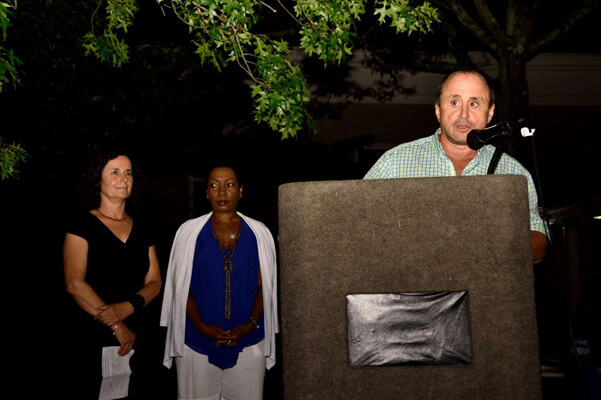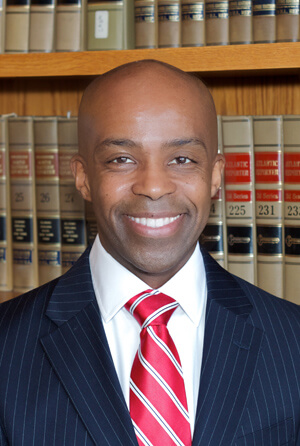Sean Patrick Maloney, an out gay attorney, faced off against Republican Congresswoman Nan Hayworth in a spirited October 15 debate –– one with unmistakable echoes of the presidential race –– at Marist College in Poughkeepsie.
While the one-hour back and forth included repeated jabs from Maloney about the incumbent’s embrace of the Tea Party and its priorities, and volleys back from Hayworth about his having only recently moved into the Lower Hudson Valley district they are fighting to represent, the issues animating the debate were the very same ones that dominated the Obama-Romney and Biden-Ryan debates of the past two weeks.
Democratic challenger Sean Patrick Maloney. | SEAN PATRICK MALONEY FOR CONGRESS
Maloney –– who is 46 and served for three years on the White House staff during the Clinton administration and was first deputy secretary for Governors Eliot Spitzer and David Paterson from 2007 to 2009 –– emphasized that the budget plan Hayworth supported twice in the House, championed by GOP vice presidential candidate Paul Ryan, would “break the promise of Medicare, end the guarantee of Medicare.” The voucher system that would replace the current Medicare structure would, he charged, cost the average senior an additional $6,400 each year.
Maloney also hit Hayworth over the Ryan budget’s elimination of funding for Planned Parenthood, which he said provides needed medical care for at least 31,000 women in New York’s 18th congressional district.
As President Barack Obama and Vice President Joe Biden argued when they met their opponents in debate, Maloney said the Romney campaign’s tax proposals would cost up to $5 trillion over the next decade. Just a small portion of that money could instead be applied to put the Medicare system on sound footing for the foreseeable future, he said.
Incumbent Republican Congresswoman Nan Hayworth.
For her part, the 52-year-old Hayworth –– a Westchester County ophthalmologist first elected in 2010, when she beat two-term Democrat John Hall with the support of roused Tea Party activists –– focused on the need to lower taxes and “make the tax code flatter and fairer,” simplify regulation, and lower energy costs. She specifically ruled out supporting any approach to extending the Bush tax cuts that would exclude higher earners –– a critical choice facing Congress, which must break the logjam over this issue by December 31 if the federal government is to avoid draconian spending cuts across the board.
Like former Massachusetts Governor Mitt Romney and Congressman Ryan, Hayworth disputed the $5 trillion dollar price tag placed on the GOP ticket’s tax plan. Saying she aims to “preserve and protect Medicare for our seniors,” Hayworth charged that Maloney’s support for Obama’s signature 2010 Affordable Healthcare Act –– or Obamacare –– would drain $716 billion from Medicare. She did not, however, answer Maloney’s rejoinder that, in twice supporting the Ryan budget, she had endorsed a similarly sized cut to Medicare –– one not to be diverted to Obamacare, but rather to the extension of the Bush tax cuts.
The 18th congressional district is a newly configured one created in the wake of the 2010 Census, and includes portions of Dutchess and Westchester Counties and all of Putnam and Orange Counties.
Maloney clearly sees his credential as a gay man who helped shape the state’s marriage equality bill, first introduced by Governor Eliot Spitzer in 2007, as an asset. He stated that, working for Spitzer, he helped draft a bill that, in order to win Republican support, explicitly acknowledged the freedom religious denominations have in deciding what marriages to consecrate. Then, Maloney faulted Hayworth for not supporting the law, signed by Governor Andrew Cuomo in 2011 –– and also for “not say[ing] what her position is.”
That taunt may have pushed Hayworth, who has a gay son, to stake out the clearest position she has voiced to date. According to the Lower Hudson Valley Journal-News, in a GOP primary debate in 2010, she responded vaguely to a question about marriage equality, saying only, “I will not seek to force a definition of marriage on the states.” In Congress, Hayworth won praise from the Human Rights Campaign for being one of four House members –– two Democrats and two Republicans –– who introduced the Tax Parity for Health Plan Beneficiaries Act, which would end the tax imposed on employer-provided domestic partner health benefits that are exempt if given to a different-sex spouse.
However, by the time Maloney began his general election campaign, after winning the June 26 Democratic primary, Hayworth had made no further progress on the gay marriage question, prompting him to tell Gay City News, “The number one issue for the community, she is on the wrong side of.”
Pressed at the October 15 debate on her position, Hayworth reiterated that she “certainly respect[s]” the right of states to define marriage as they see fit, but also that she “respect[s]” the fact that New York has made its choice. That position clearly does not embrace marriage equality nationwide, but it suggested that Hayworth sees the issue as a settled matter in New York –– which, of course, it is.
“I welcome her to the equality team,” Maloney said, clearly enjoying the straddle his opponent finds herself in.
Hayworth’s campaign has put considerable effort into painting Maloney –– in the words of several of its ads –– as a “carpetbagger.” He moved to the Putnam County town of Cold Spring, on the Hudson River, in early 2012, after years of dividing his time between Manhattan and a country home in Sullivan County, which is just west of the 18th district. Without using the word carpetbagger in the debate, Hayworth hit on that theme repeatedly, in one instance asking Maloney whether he had yet made his first property tax payment in Putnam County. She also said that as she toured areas of the district ravaged by Hurricane Irene in 2011, Maloney was “probably” in Manhattan.
Maloney wasted no time in using Hayworth’s mention of Hurricane Irene to paint a sharp contrast between the two candidates on how they view the role of government. He recalled seeing Hayworth, at that time, stand side by side with House Republican Majority Leader Eric Cantor as he threatened to stall hurricane relief funding until Democrats would agree on offsetting budget cuts, a politically disastrous move the GOP quickly backed off of.
His opponent, Maloney charged, “has repeatedly said the government should stop trying to create jobs,” a posture he linked to her “Tea Party ideology.”
In contrast, Hayworth, at several points in the debate, emphasized her ability to work “with Democrats and Republicans alike,” though her descriptions of bipartisanship sounded strangely out of step with the realities on Capitol Hill over the past two years. Praising Democrats from Governor Andrew Cuomo to former President Bill Clinton, Hayworth sought at times to paddle back from her posture in the 2010 campaign, when she told the Tri-State Sons of Liberty, a Tea Party group, “I think it’s pretty cool to be a radical… I am proud to be a radical.”
Still, Hayworth, alluding to her Tea Party support two years ago, said, “I was proud to have the support of people with my view of the constitutionally-defined role of the federal government.” She also declared, “We have a federal government that reaches too far into our lives and too far into our pockets.”
Though she said she differed with the Tea Party on environmental issues, Hayworth disagreed with Maloney’s statement that the Indian Point nuclear power plant should be closed, and even while saying she doesn’t “expect” fracking to take place in the Hudson Valley, she similarly refrained from seconding the Democrat’s hard line against the natural gas extraction process.
Hayworth endorsed the “First Amendment finding” by the Supreme Court in the 2010 Citizens United case, which opened up this year’s election to the deluge of super-PAC spending. Maloney called that decision “the worst Supreme Court ruling in the past 20 years.
Maloney praised Obama for having “eliminated the threat of Osama bin Laden,” but when Hayworth charged that he was a “Pelosi Democrat,” he claimed the mantle of being a “Clinton Democrat.” The former president –– also his former boss –– will appear at an October 17 “intimate reception” on Maloney’s behalf at the home of Diana Taylor, the former state banking superintendent who is also Mayor Michael Bloomberg’s longtime companion.
If elected, Maloney would become the first out gay or lesbian member of Congress from New York and –– with a record number of LGBT candidates –– would at least tie for being the sixth nationwide.
Maloney has scrambled to diminish an incumbent’s natural fundraising advantage. Through September 30, he had raised $1.56 million, with just under $1.3 million coming in individual donations. Hayworth’s total was $2.65 million, but only $1.4 million came from individual contributions, with the rest from political action committees. Despite her fundraising upper hand, Hayworth trailed Maloney in cash on hand at September 30, with $785,000 to his $855,000.
A Sienna Research Institute poll released October 19 showed Maloney gaining traction, trimming a 13-point Hayworth lead to seven points, making it a 49-42 percent race.
In a post-debate comment, Maloney spokeswoman Evangeline George doubled down on her candidate’s message, saying, “This debate was a victory for Sean Patrick Maloney and a victory for Hudson Valley working families. Tea Party Congresswoman Nan Hayworth simply couldn’t defend her efforts to defund Planned Parenthood or her votes to end Medicare’s guaranteed benefit in order to pay for more tax breaks for millionaires like herself.”
The Hayworth campaign did not immediately respond to a request for comment.
The debate was moderated by Capital Tonight's Liz Benjamin and Nick Reisman.































